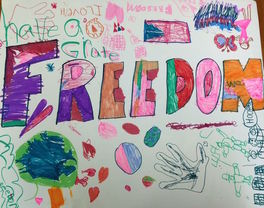 And, I promise I will stop trying to convince you. Convincing doesn’t work, and it never has. And, it’s making us dumber. Convincing is a form of coercion. Power imposed. It seeks conquest of the others’ perspective (action), which usually only retrenches the others’ perspective (reaction). Think about a time when you knew someone was trying to convince you of something counter to your beliefs. How did you respond? I know my initial response is usually to defend and challenge, if for nothing else, the sport of it. In fact, I have never been convinced of anything, and, I bet, you haven't either. When it seems like we have been convinced, what has actually happened is that we have learned. Someone has shared a new perspective in a way that we could understand. They have provided new information that we were able to consume. They have posed a question that gave us a safe space to rethink our assumptions. They have done something that has enabled us to reflect on our positions in a way that alters them. Something has happened within us. They haven’t imposed it, forced it, or made it so. They haven’t convinced us. They have provided a prompt and/or an environment in which we could convince ourselves. This is teaching/learning. This is the open exchange of power. In a post-truth America, understanding this dynamic is even more critical. There will always be facts, “facts”, and “alternate facts” that will make any case on anything. We can always find someone on the Internet who agrees with us, or we can say it enough times in enough places that it appears so. This emboldens those who want to convince and bolsters the defense of those who won’t be convinced. The logical conclusion of this dynamic then is a stalemate, the end of teaching and learning, a perpetual confirmation bias arms race with the chilling effect of an intellectual Cold War. Stop convincing. Start teaching. Stop being convinced. Start learning. It’s critical to our relationships and fundamental to our democracy. You’ll never convince me otherwise.
0 Comments
 I got this question on the way to daycare the other day, on my first morning heading back into work after a few days off for the holidays. I appreciate my four year old starting my day with an easy question. She heard the word in a song on the radio. I stumbled through some answer about having choices and opportunities to do the things you want. I was immediately unsatisfied with my answer but, at that time of morning, I was not yet able to muster one that could do the concept justice, and be consumable by my daughter. After I dropped my girls off, I reflected on what I should have answered and got really mad at myself as I continued on my way to work. Regardless of what she processed, I had answered her with the myopic and self-centered version of freedom that I detest, and that I think is at the source of our stumbling Democracy, presumed to be based on the concept. I had regurgitated a slogan. I had delivered a sense of freedom that conflates principles of capitalism with those of democracy. I had conveyed to my daughter that it was all about her, places she could go, things she could do, objects she could possess. I had defined an individualized version of freedom that is at the source of structural privilege and thus reinforces an acceptance that different people in our country inherently have access to different levels of freedom. I had shared a version of freedom that I hope, more than anything I can accomplish as a parent, she will fight like hell against. My children are privileged, just like I am privileged. I have written before about how privilege goes unnoticed in the privileged, becomes entitlement, supremacy. And, it goes unnoticed largely because the experiences of the privileged are generally free. There are no structural barriers or institutional resistance that challenge our daily lives. I basically get to do what I want to do, go where I want to go, buy what I need to buy and generally live without too much friction that I don’t create for myself. I’ve got freedom. So, I could easily assume these experiences define the term. The freedom of privilege. But, my freedom is bound fundamentally with the freedom of others. Like justice, there is no freedom for some and not for others in a society that is premised on the ideal. So, my sweet child, let me revisit: freedom isn’t about you. It’s about us, all of us. It’s about having a sense of responsibility for others that is as strong or stronger than the one we have for ourselves. It’s about holding ourselves accountable for doing more than accepting the fruits of our privilege, being more than the freedoms offered us because of the way we look, how we talk, our physical abilities, how we worship, or who we love. Freedom is something that is creative, generative. Freedom is not consumed. It does not have lines of demarcation. Freedom is a fight but it should never be a weapon. So, let’s listen to that song again. Let’s lift our voices for a better definition of freedom and know that it is one we will have to create together. |
Categories
All
Archives
April 2024
|
 RSS Feed
RSS Feed